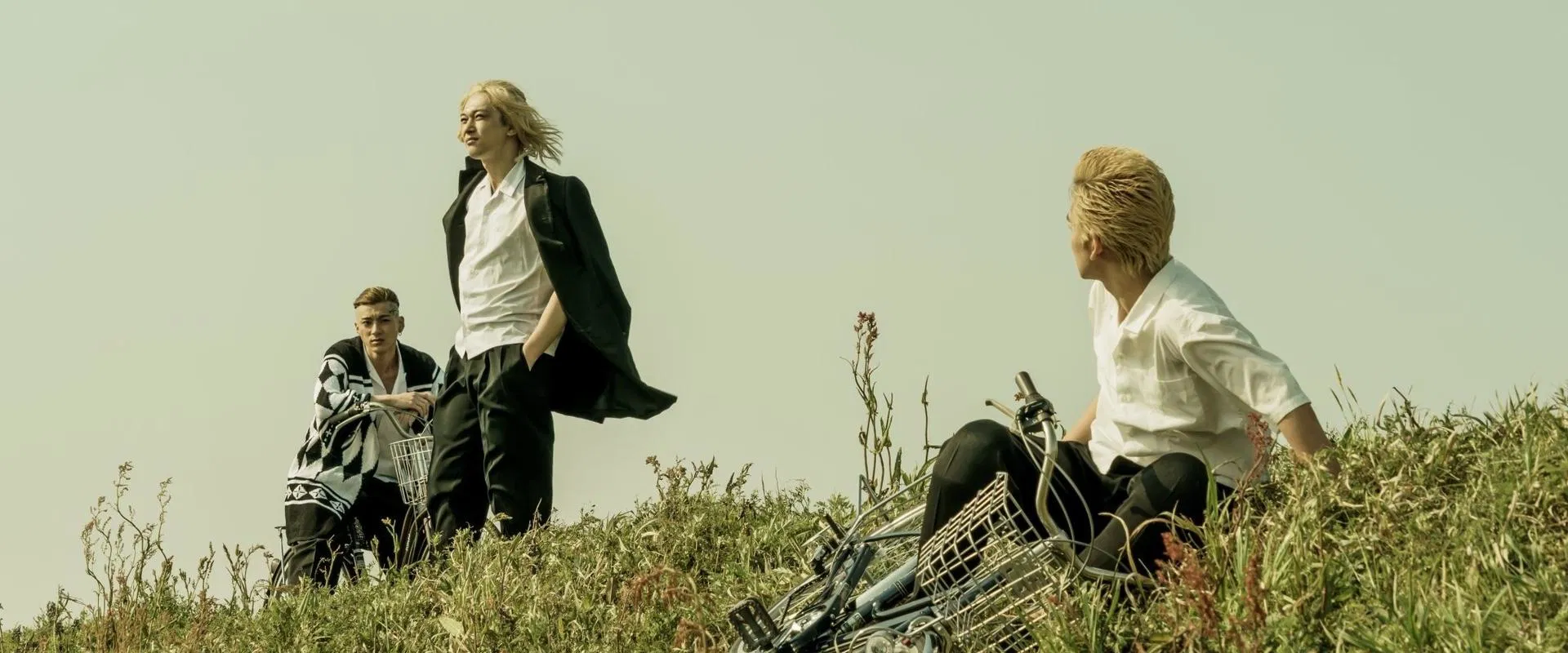If the movies have taught us anything about time travel, it’s that the past might be a playground for regret—an endless loop of adolescent screwups getting a second (or third, or twentieth) shot at rewriting the fate of humanity, or at least saving their high school sweetheart. Tokyo Revengers, a turbo-charged punk vacuum pressed into gangland melodrama and science-fiction stripes, wants desperately to ride that carousel—sometimes dizzy, sometimes earnest, and blessedly, just self-serious enough to keep you from rolling your eyes straight out of your skull.
Directed by Tsutomu Hanabusa with an obvious affection for the frantic pop mythology of Ken Wakui’s manga (and with the same pitter-patter anxiety that comes when you try to corral dozens of delinquents into movie form), Tokyo Revengers crams together a murder-of-the-week mystery, a wounded puppy love story, and a series of brawls so stylized, you’d swear the (very pretty) bruises came from a boutique.
The plot, for those uninitiated in the symphony of echoing tropes, is earnest, convoluted, and charmingly blunt. Takemichi Hanagaki (Takumi Kitamura, gamely wringing every ounce of pathos from his feeble fists and equally weak resolve) is that perennial Japanese loser—a 26-year-old washed-up nobody doomed to spotty hair and minimum-wage humiliation. When news reaches him that his beloved, Hinata Tachibana, has been offed by the omnipresent Tokyo Manji Gang, the universe hands him a cosmic mulligan: a time-slip back to adolescence, complete with the stench of gym uniforms and all the humiliation an ex-boyfriend can stand.
The time travel hook, which has been the narrative espresso shot of so many weary franchises, is neither an embarrassment nor an epiphany here. It moves with just enough pop to keep Takemichi stumbling into his own destiny, and just enough clunk to remind us that this story is about missed opportunities more than it is about fate. If you’ve ever wondered how many times cinema can stage “the weakling finds his spine,” here’s one more page for your scrapbook. I found myself tallying the borrowed beats—hero relives crucial moments, attempts to rescue the doomed, fails, cries, tries again. It’s formula, all right, but it wears its heart on its bruised sleeve.
But where Tokyo Revengers manages to surprise is in its pleasure principle—the fight scenes flamboyant without ever getting crushingly self-important, the camaraderie sincere despite the fact that every relationship feels written in the sky for miles. Takumi Kitamura, as Takemichi, gives the kind of performance that’s equal parts sunlight and slapstick. Rarely has a protagonist’s flailing desperation been so gamely performed; there’s an innocence to Kitamura’s mugging, like a gangly Charlie Brown on the wrong side of Tokyo. There are moments (too many, perhaps) when the film leans right into cringe—the sort of emotional athleticism that makes you want to both hug and throttle him—but damned if it isn’t occasionally charming.
The real electricity, though, pulses through the supporting cast. Yuki Yamada, as “Draken,” has the kind of lived-in loyalty that makes you wish he’d get his own spin-off; the friendship between him and Kitamura is the clearest emotional note in the film, a bristling, bracing heartbeat in all the on-screen chaos. Ryo Yoshizawa’s Mikey is another story—a bit of a runway model disguised as a crime figure, too ice-cream cool to be the kingpin the script wants, but fascinating as the charismatic cipher that stands at the center of the movie’s storm.
If only Hanabusa’s direction took as many risks with character as it does with style. For every beautifully kinetic brawl or whiplash cut, there’s a lingering sense that we’re skating on emotional surfaces. Tokyo’s gangland is ripe for tragic grandeur, but our villains are one-note—glowering in designer jackets, all myth and no marrow. You want to know what drives these kids—what secret heartbreak, what psychic fissure—but the movie, for all its jump-cuts and shouts, keeps you at arm’s length. It’s a live-action comic book that sometimes forgets to color in its margins.
Which is not to say that the film hasn’t figured out how to have fun. The action choreography has the giggly momentum of recess, and Hanabusa’s glossy direction (all busy streetlights and boot soles flashing through the rain) is just theatrical enough that you’ll forgive the odd narrative swerve. But for every pulse of adrenaline, there’s a dialogue exchange as stale as last night’s ramen. Izumi Takahashi’s script is functional and sometimes funny, but rarely finds the poetry buried under the pompadour. One lens-flare away from real pathos, and ten punchlines too many.
Underneath it all, Tokyo Revengers is a movie about the saving grace of brotherhood, the sweetness of hopeless causes, and the bruised-knuckle yearning for a better yesterday. It doesn’t quite soar, but it never collapses under the weight of its own expectations, either. Its closest siblings are The Girl Who Leapt Through Time and Erased, both of which find deeper soul in science fiction heartbreak—reminding us that the greatest trick of time travel is not saving the world, but reopening our own haunted chests.
Against the ghostly parade of gangland fables—Back to the Future, Looper—Tokyo Revengers hums a jangly tune that’s all its own: less clever, more sincere, a little rough at the edges, and unmistakably dyed in the ink of shonen manga.
Walk into this film expecting Shakespearean depths and you’ll come away hungry; but surrender to its ramshackle sentiment and you might find yourself rooting for the underdog one more time. Call it guilty pleasure or earnest spectacle: it’s a brawl worth watching, cringes and all. And isn’t that what movies, at their best, promise—a chance, however fleeting, to fight for the lost love, and maybe, just maybe, to get it right the second time around?


